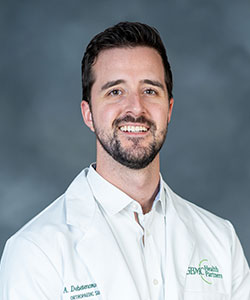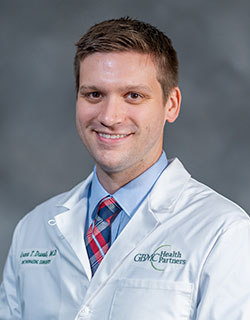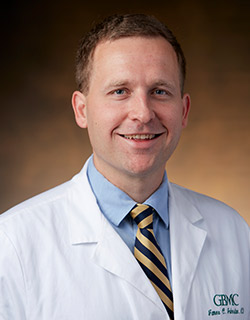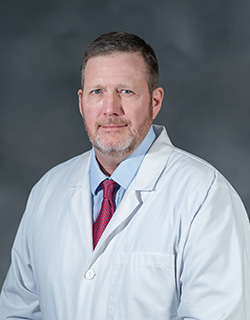Health expert recommends evaluation for hip pain and low energy fractures
February 19, 2024
As people age, the risk for certain diseases and injuries increases. Sometimes, risk of injury is directly related to a disease, such as the loss of bone density and increased risk of bone fractures due to osteoporosis.
James C. Johnston, MD, an orthopaedic surgeon at GBMC Health Partners Orthopaedics, explains postmenopausal women over the age of 50 are especially at risk of breaking a hip.
“As women age, they don’t produce as much estrogen, which weakens their bones. That, combined with weakening vision and balance, makes for an increased risk of hip fractures,” he says. While postmenopausal women are at a higher risk, everyone over 50 should be aware that their bones may not be as strong as they used to be.
Osteoporosis is a silent disease, says Dr. Johnston, so you wouldn’t know you have it until you break a bone.
“There isn’t a way to stress test your bones like you can with your heart on a treadmill. So, a low-energy fracture, like breaking your wrist by tripping over a rug, may be the only indicator that your bone density could be improved,” Dr. Johnston says. “You can also get a DEXA scan to measure bone density and use the FRAX Score (Fracture Risk Assessment Tool) online can help assess your risk for osteoporosis.”
If you are diagnosed with osteoporosis or osteopenia (pre-osteoporosis), there are some things you can do to increase your bone density.
“Resistance training (weight-bearing exercise), avoiding alcohol and smoking, eating a balanced diet, and making sure you are getting enough vitamin D3 to build up your bones are all ways to treat and even reverse osteoporosis,” Dr. Johnston says. “Preventing falls is also incredibly important. If you don’t fall, you don’t fracture.”
Increasing core strength, working on improving your balance, and having confidence as you walk can all help prevent falls, and in turn, prevent fractures.
There are several types of hip fractures and various ways of treating them, usually requiring surgery. Dr. Johnston says the methods of treatment will vary from patient to patient, and that’s where having a dedicated team of specialists, like the ones at GBMC, comes into play.
Another cause of hip pain as we age, not osteoporosis-related, is arthritis and this often occurs because of the way the hip is formed at birth. Trauma, genetics, family history, and even birth order can play a role in how your hip socket is formed, Dr. Johnston says, and some impingements can lead to hip problems later in life. He says keeping your weight in a healthy range is the best way to avoid hip issues due to arthritis as you get older.
“If you have mild hip arthritis, carrying excess weight will only make that problem bigger, and hip problems are tough to treat because everything you do requires your hips,” he says.
He also suggests low-impact exercises and avoiding deep squats and lunges to reduce the chances of further aggravating the stress on the joint. While weight loss is the single best way to treat arthritis, other treatments range from therapy to anti-inflammatories, cortisone shots and hip replacement surgery.
“When you have hip arthritis and need a joint replacement there is more than one choice of hospital. We want patients and their families to know GBMC has an incredible joint replacement center,” Dr. Johnston says. “We have great surgeons and dedicated anesthesia teams. We’ve received the Joint Commission Certification for hip and knee replacement, and our team goes through the whole process with you. We have social workers for pre-op, great staff in the operating room, and an entire therapy team in the hospital and in your community that works together to bring a holistic approach to your care.”







